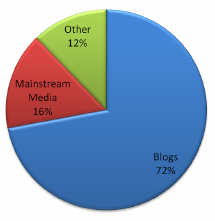Sure, the digital age might be killing professional muckraking in local markets, and most of the spadework that becomes local news stories might still come from newspapers. But a new empirical study suggests that all the new online din isn’t crowding out serious policy debate.
Just the opposite: Startup news sites are drawing far more attention to actual local policy than newspapers, TV, or radio.
That’s my take on this study, first presented in December, of where discussions about Portland’s city government are happening online. As reported by the Portland Mercury, social media consultant Jamie Beckland dug through six months of articles and comments from a variety of local sites for uses of the words “bureau,” “city,” “government,” “agency,” or “department” in conjunction with “Portland.”
 He found that topical local blogs ran rings around traditional media when it came to such references. The site that racked up the most posts and comments about those dry topics was bikeportland.org, a professionally reported blog for the city’s intense bicycle scene. Number two: mentalhealthportland.org, a daily filter of articles about people with mental illness and their run-ins with the law. Also in the top six: hipster hangout Blogtown PDX, hyperlocal aggregator neighborhoodnotes.com and libertarian opinionator bojack.org. (Full disclosure: I’m friendly with many of these sites’ creators.) And finally, down at #9: The Oregonian.
He found that topical local blogs ran rings around traditional media when it came to such references. The site that racked up the most posts and comments about those dry topics was bikeportland.org, a professionally reported blog for the city’s intense bicycle scene. Number two: mentalhealthportland.org, a daily filter of articles about people with mental illness and their run-ins with the law. Also in the top six: hipster hangout Blogtown PDX, hyperlocal aggregator neighborhoodnotes.com and libertarian opinionator bojack.org. (Full disclosure: I’m friendly with many of these sites’ creators.) And finally, down at #9: The Oregonian.
All told, the upstarts accounted for 72 percent of local posts and comments that met Beckland’s test, compared to 16 percent for sites he identified as “mainstream media.”
What gives?
A couple sites on Beckland’s list, it’s true, probably scored so high because they just reproduce city press releases. And it’s not as if the metro daily paper ignored City Hall, where Portland’s mayor spent the year clawing out of a sex scandal.
But that’s the rub: when legacy media like The Oregonian write about local government, they try to maximize the audience by focusing on politics and narratives. Who’s in, who’s out? Who’s lying, who’s honest? Important stuff, but it doesn’t lend itself to words like “bureau” — or to substantive coverage of how a city is actually being run. That’s because any given local-policy story only appeals to the narrow sliver of people that the policy in question affects. In the mass media, that’s not profitable content.
Startups like BikePortland are different. When topical news startups cover local government, they don’t aim to be interesting to many; they aim to be indispensable to a few. The result? A network of niche sites that spend a lot of time actually working with the nuts and bolts of whichever local policies matter most to their particular audience.
I don’t know about you, but that’s a trade I’ll take.